Lab Meeting on 19 December 2019
This week I asked everyone in the lab to create a picture that visually illustrates (some part of) what they’ve done this year and a paragraph update. I’m so completely blown away by how wonderful they all are that I’m just going to jump right into them for this post.
There are a few celebrations and questions we’re thinking about at the end of the post too, so its a bumper edition!
If you don’t make it to the end, I’ll use this space to say thank you so much to the lab for their exceptional work this year, and to wish you all the very best in 2020.
Patricia Herterich
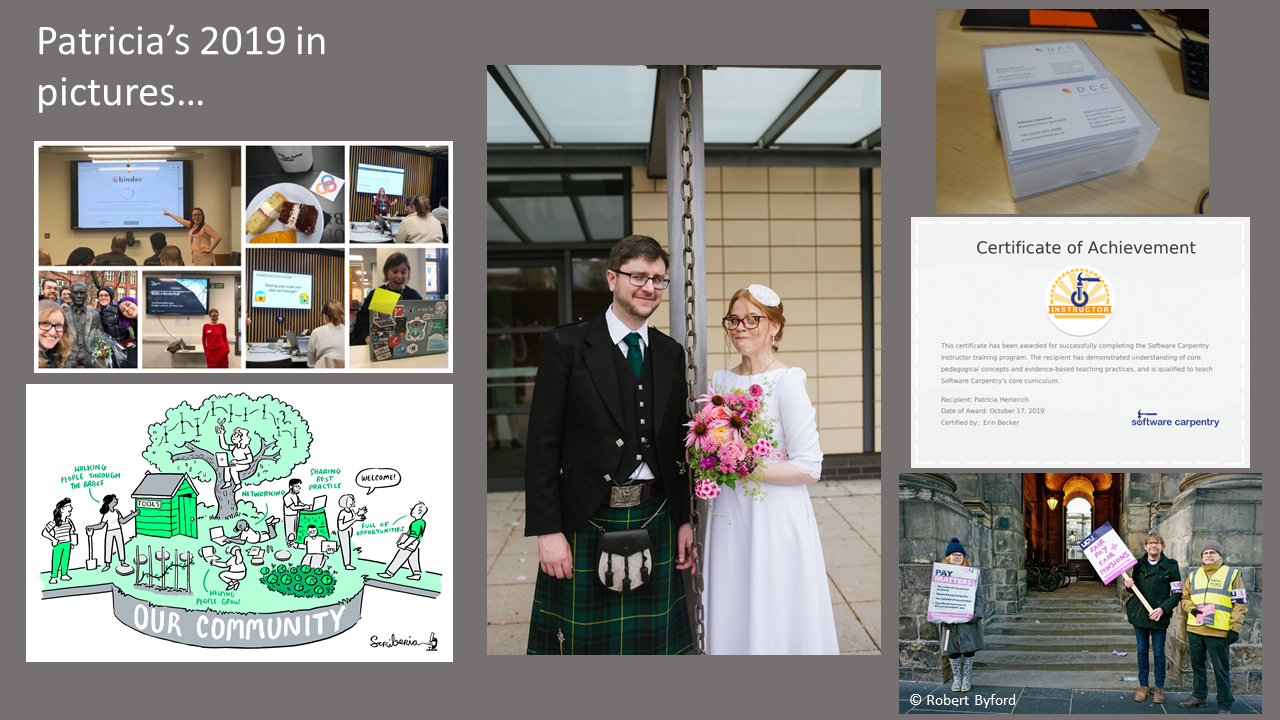
I’m proud to have been invited to be part of the Turing Way core team developing a handbook completely in the open and building a community around it. Working on the project has given me the confidence to present at events again and renewed trust in my skills (technical knowledge as well as organizing and running events), highlighted areas of expertise and shown me what I really value in interactions and collaborations. I successfully applied for a Software Sustainability Institute Fellowship, became a Carpentries instructor and found a new job that aligns more with my values and beliefs. They both provide me with opportunities to give back to the open community that has supported me in the past and I can’t wait to start mentoring for the Open Life Science programme and get involved in other open projects in 2020.
Sarah Gibson
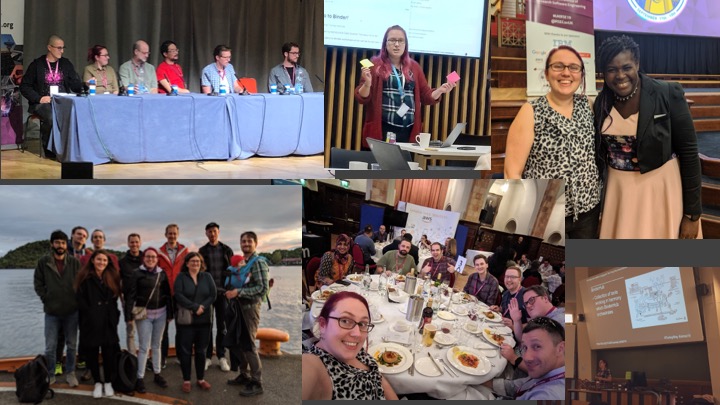
I am proud of how my presenting skills have developed over the last year. While I never considered teaching and public speaking to be my strongest skills, I can take pride in having received very positive feedback. I’m also proud of the network of amazing people I’ve managed to surround myself with. I’m also really proud to have been invited to join the mybinder.org operating team.
- Applied to be a 2020 SSI Fellow 🤞🤞🤞 and openly developed the application on GitHub.
- Took initiative to contribute/organise for the community.
- People actually ask my opinion on things now, like I know what I’m talking about. And they think it’s a good idea for me to express those opinions on a panel at RSE Con.
Konrad Adler-Wagstyl
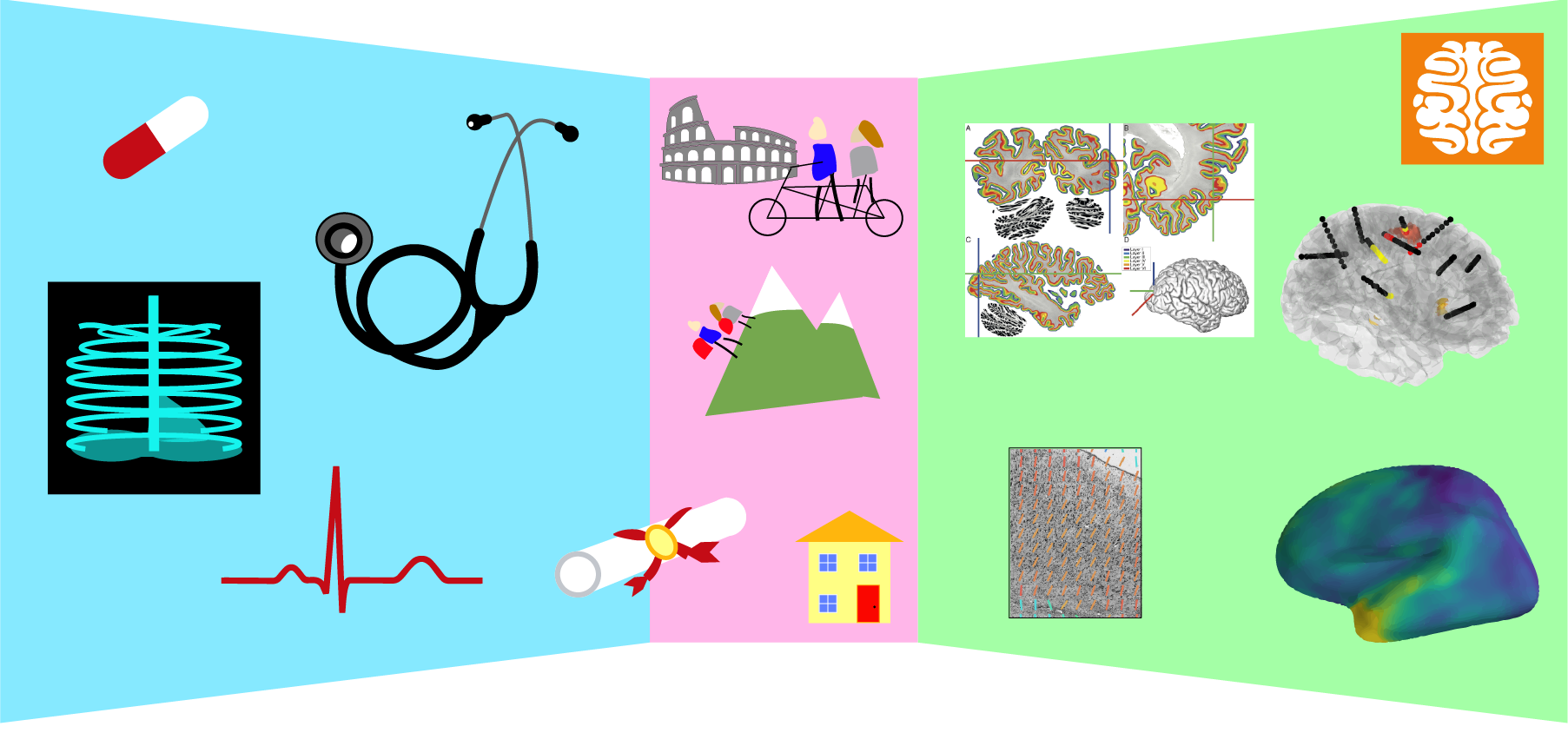
After 10 years being a student, 2019 was the year I finally finished medicine and started full time in research. I’ve absolutely loved reinvigorating existing collaborations and starting new ones.
The MELD project continues to expand, with new sites, researchers and clinical validation projects. It’s been great to see the spreading enthusiasm for working openly in the field.
One highlight this year was leading my first open science workshop. It was a real joy sharing the diverse, openly available tools that are part of our workflow and seeing how everyone in the room wanted to try them out immediately.
One thing I’ve realised this year is that I work best with others. Working so openly in MELD has made it much easier to collaborate. For 2020 I hope to do the same with my work on cortical microstructure - making the tools and data for analysing cortical layers and columns more open and accessible.
Louise Bowler
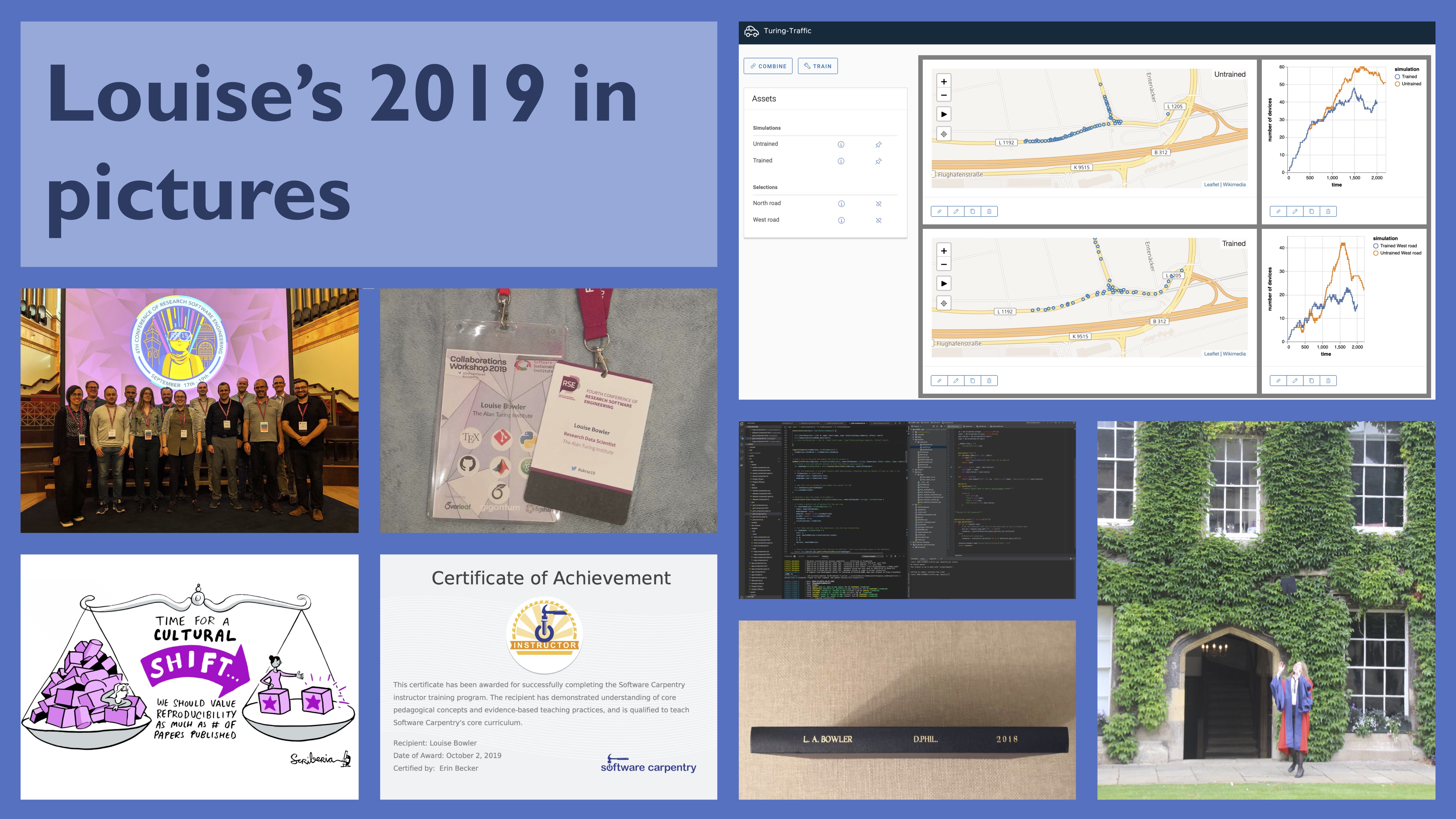
A common theme for me throughout 2019 has been finishing things - it’s the first time I’ve wrapped up projects at the Turing, and I also tied up some loose ends from my PhD and finally graduated.
The Toyota Mobility Foundation visualisation project has been my most technical project at the Turing so far. I really enjoyed the move into web development and visualisation, and I learnt so much over the course of the project. Looking back at the code now, I can see how far I’ve come - it’s very difficult to say that I’ve made the “final, final” change!
The Turing Way has been a huge influence on me this year - as an introvert, working openly in a big team was initially a daunting step for me, but I have really come to value how the effort we put into building the community is reflected in peoples' acceptance, friendliness, politeness and helpfulness throughout the entire project. I’m sure The Turing Way is in for another successful year, and I’m looking forward to seeing it happen.
Thanks to the Turing’s Research Engineering Group for the photo from RSECon.
Ang Li
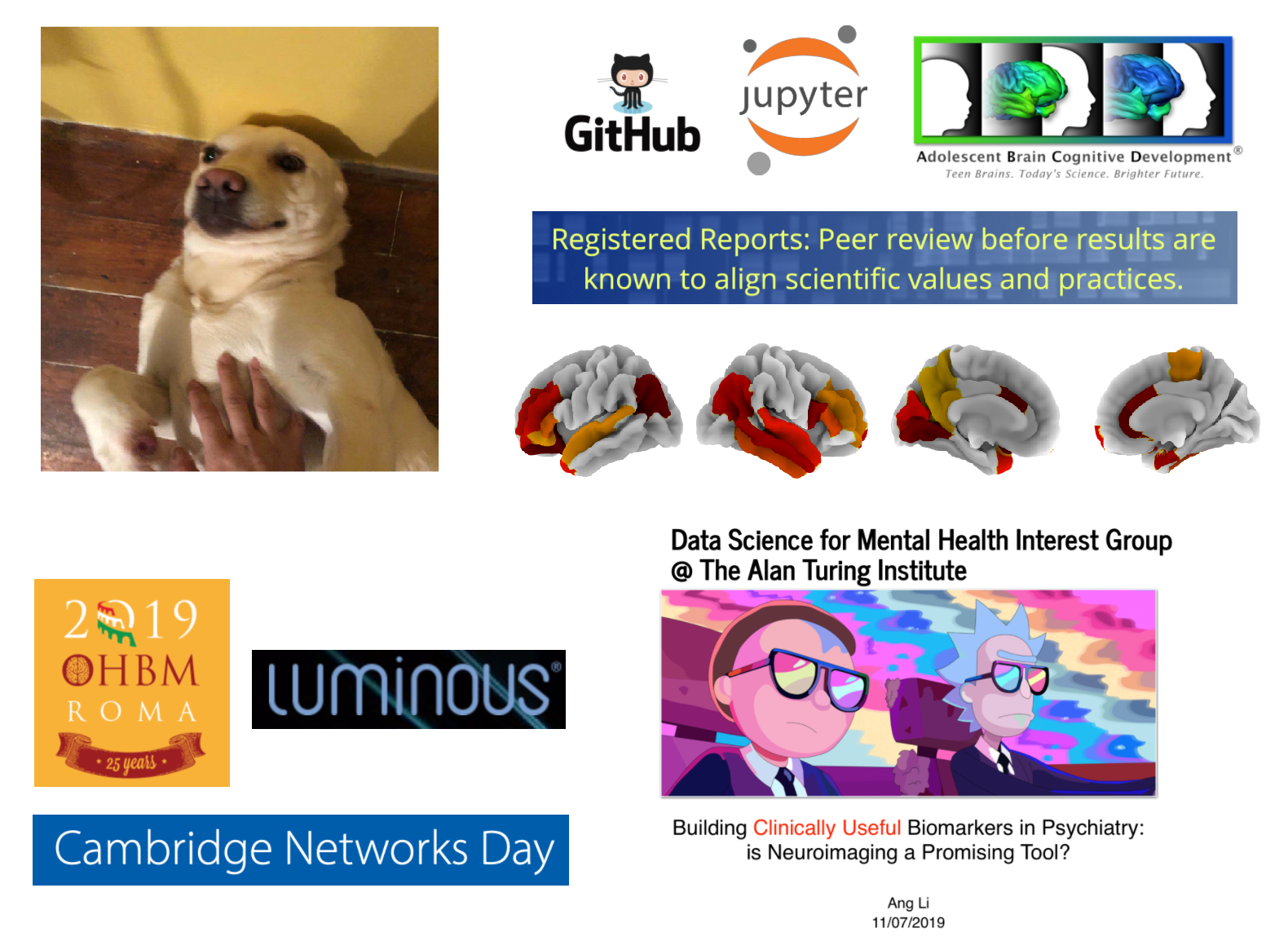
2019 is a special year for me as a visiting student in the UK and I appreciate Kirstie a lot to give me this opportunity. Living in London means that I have to rent a room and cook for myself. I can do really good cooking now and have fun with my landlord’s dog (shown in the picture)!
I have worked with Kirstie and Yini to develop a registered report based on the ABCD project, with all code and pipeline available. Several of my other works also went well. At the same time, I learned a lot from Kirstie in the use of Github as well as The Turing Way. I’m excited in preparation for contributing a new section in power analysis. Really looking forward to more chapters in The Turing Way.
I have attended several really wonderful conferences in Europe, including Cambridge Network Day, OHBM and Luminous workshop, and they are all amazing! Moreover, I gave my first English presentation in public at the Turing mental health group.
Georgia Aitkenhead
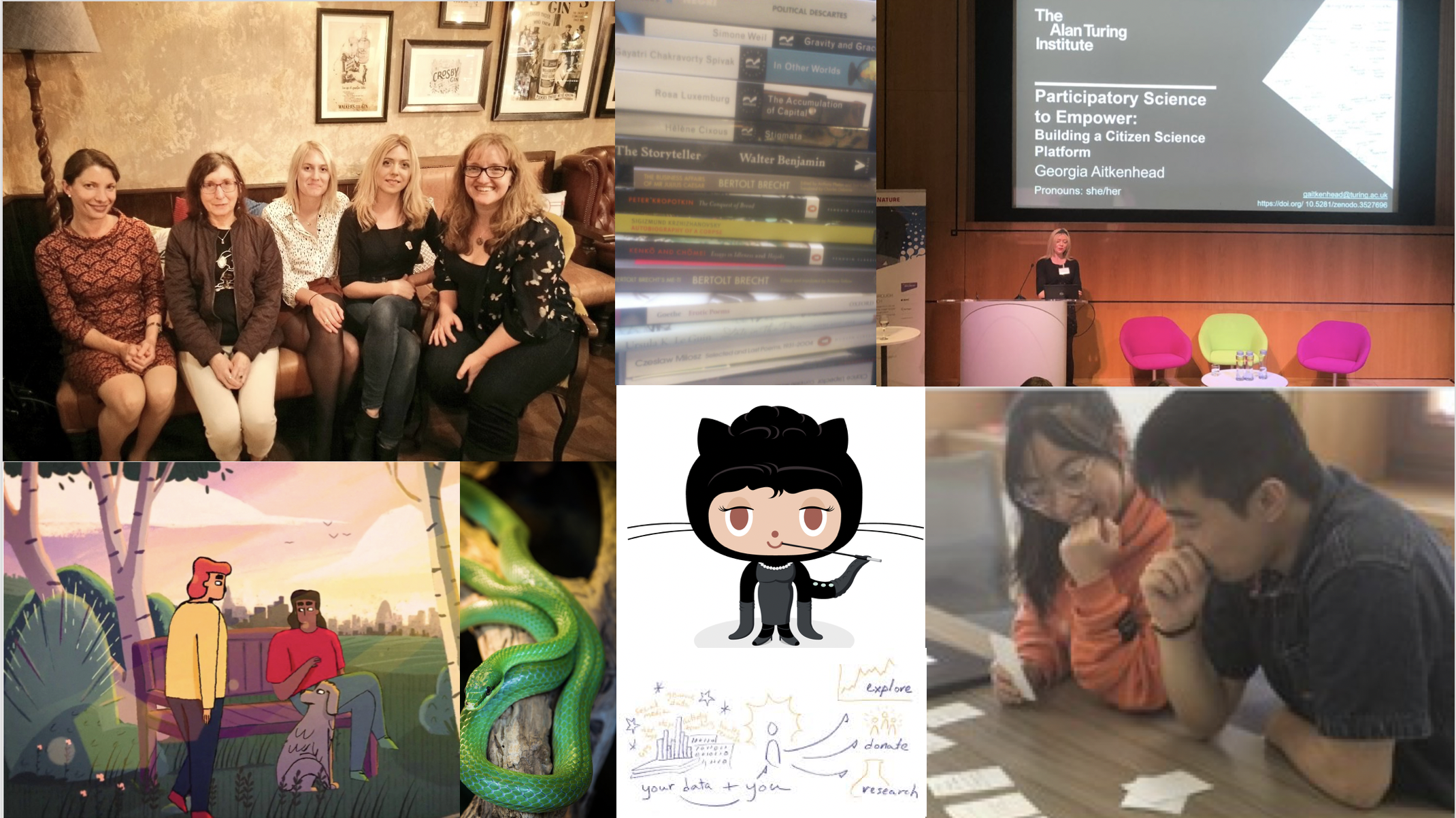
2019 has been a year of many new horizons! I’ve loved my first year at the Turing -so many amazing people and projects, and of course Kirstie’s amazing mentoring 💖. Python turned out not be as scary as it looked, but just as loopy! And GitHub is friendly after all.
I’ve especially enjoyed working with all my autistic collaborators. The insight group has been really enlightening, and I’ve loved learning about open science, reproducibility, and neuroscience from lab members. I’ve had the chance to deliver my project at conferences and events, and learned a huge amount - MozzFest, the ODI conference, and the eLife sprint all stand out - thanks so much for test-running my game, Yini, Ang and Patricia.
Elizabeth DuPre
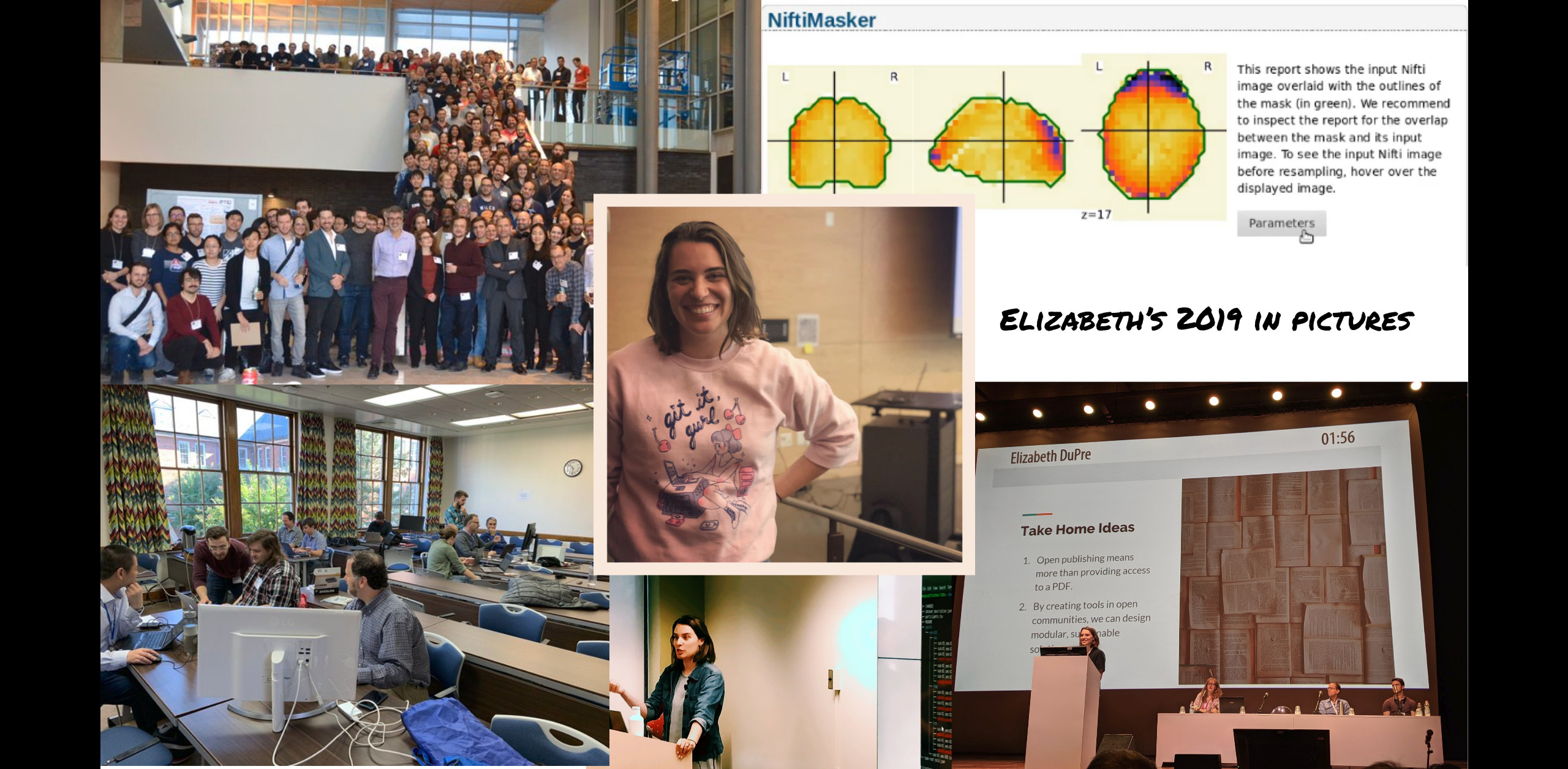
I’m spending the end of 2019 feeling really lucky for being where I am; to be working with so many wonderful, passionate people; and to have the freedom to explore topics I’m really excited about.
For me, it was the year of joining the Neuro-AI community here in Montreal, speaking at an international conference for the first time in the OHBM open science symposium, and heading back to Neurohackademy for the first time since 2016 – but this time as an instructor! It was also a year of building stronger communities for open source projects I really care about, like tedana and nilearn.
Yini He
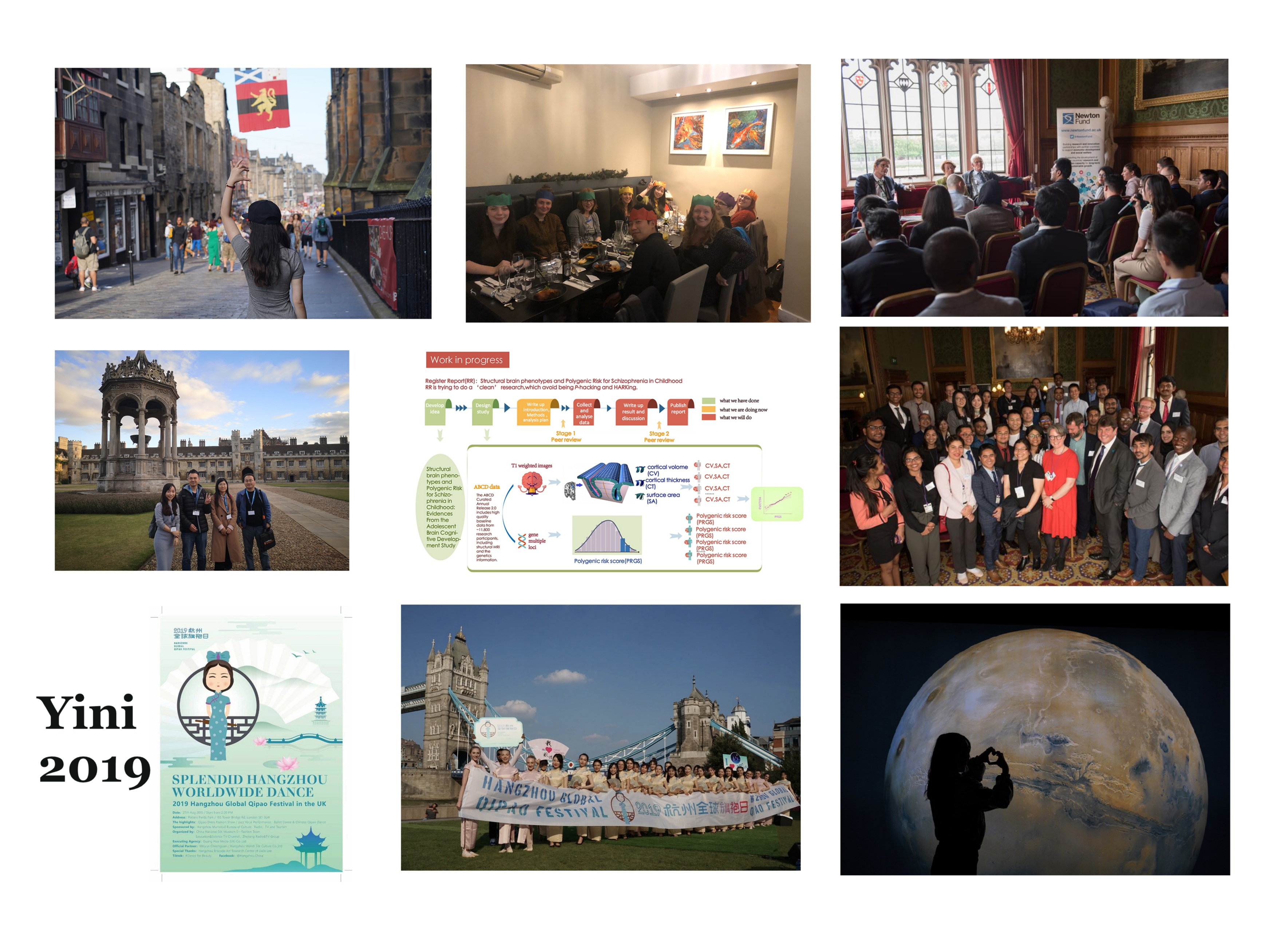
This was the first time I stay in a foreign country for such a long time. I am so grateful that you always gave me hands. I never felt alone at Turing, and everyone in our lab is invisible energy for me. Many thanks. With your help, I can face my disadvantage, leave my comfort zone and start moving forward.
It is my pleasure to take part in the ABCD project, and from this project, I learned the ideas of open science from Kirstie. It is happy for me to study python with Georgia. Ang taught me a lot about genetic research and became my programming teacher.
I hope I can take part in and make contributions to The Turing Way in the new year!!!
Kirstie Whitaker
It’s worth acknowledging here that I suggested 150 words to everyone else….and completely disregarded that for my update. Let’s call it managerial prerogative 😉
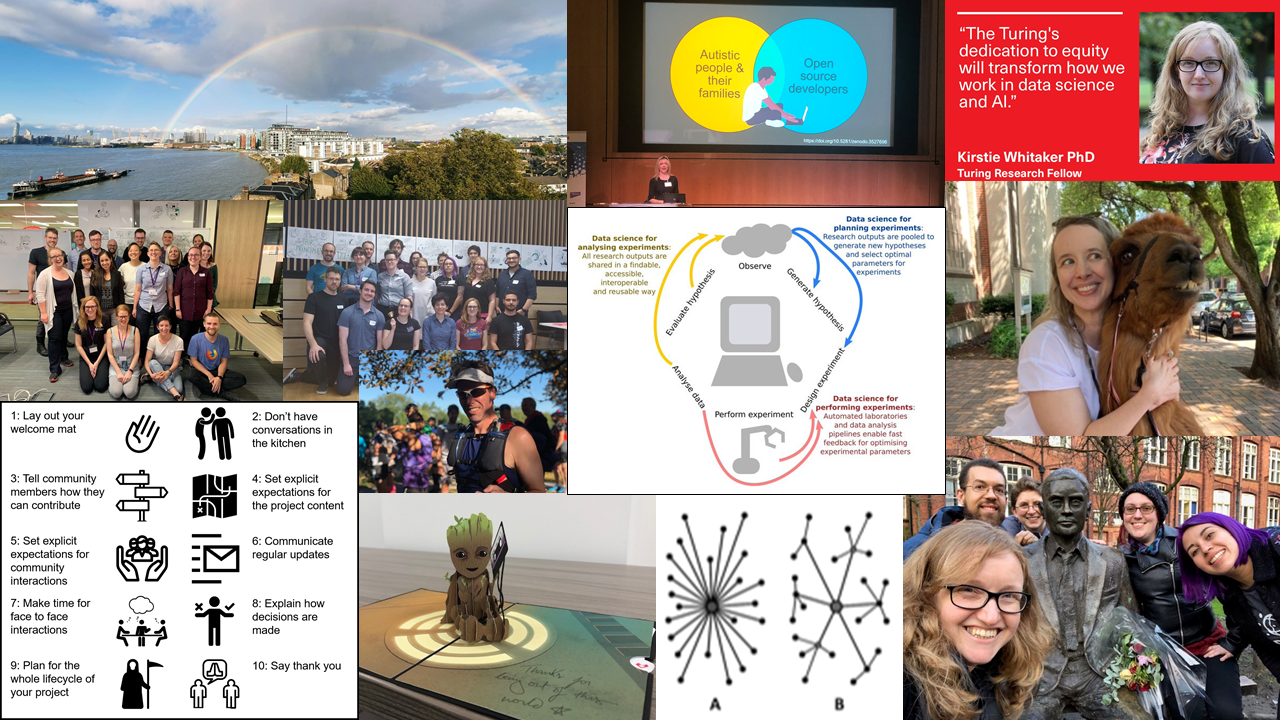
As I reflect on 2019 it’s heart warming to realise how many of my favourite moments were actually great successes of others. It has been a joy this year to mentor and support so many incredible people.
To go around my picture, spiralling inwards from the top left:
- I’ve loved living in Greenwich this year, the view from my apartment is beautiful and I’m so glad to be able to walk Luna through the park to our favourite coffee shop over the weekends.
- Georgia has been doing incredible work on the Autistica/Turing Citizen Science project and I’m excited to build the community in 2020.
- I’m still really enjoying working at the Alan Turing Institute and proud to have helped to shape the Tools, Practices and Systems research programme in 2019.
- csv,conf,v4 was an incredible experience, particularly because I got to hang out with incredible friends (such as Danielle pictured here with Rojo the llama). All conferences should start with a spa afternoon!
- The Binder workshops this year were spectacular. Huge thank yous to the wonderful Turing Way team who made them happen!
- I’m proud to have spent a lot of time this summer thinking about how to connect lab members together in a strong, resilient, decentralised network. I’m not sure we’re totally there yet, but I think we’re making good progress.
- I think this Baby Groot card from Elizabeth is the greatest thing I’ve ever seen and it reminds me to focus on the things I have control of and to let go of my jealousy as best I can #GrootGif style 🙌
- This year I started going over to write with Kelly Clancy and I wrote up 10 simple rules to run an open and inclusive community online. I didn’t get the paper done 🤦♀ but I did give a talk on the topic and I love this little infographic!
- I couldn’t reflect on the year and not include the spectacular Turing Way Book Dashes 📚 💨💨 These were a bit of a random idea I had that worked out better than I could ever have imagined. THANK YOU so much to the team for running them, and the amazing community for coming and contributing so much to the book.
- I’ve put in the figure from Daphne and my paper in eLife on Data science for the scientific life cycle because I love this paper so much. (Not included, but a paper I also love is the one that James Hetherington led on Design choices for productive, secure, data-intensive research at scale in the cloud.)
- And to finish, that little picture of the dude looking all cool in his shades and visor, is of James, my wonderful boyfriend just before he ran his first 50 mile ultra marathon. I couldn’t do the work I do without him. I am a kite and he lets me fly ❤️
There are so many things I couldn’t fit into this picture. Everyone’s contributions in the lab are so deeply valued. I’m so privileged to work with everyone mentioned in this blog post.
Thank you so much to you all. Here’s to many more exciting times together in 2020.
And now for our regular lab meeting updates!
Celebrations and cool things to share
We had a lovely lab dinner on Saturday!
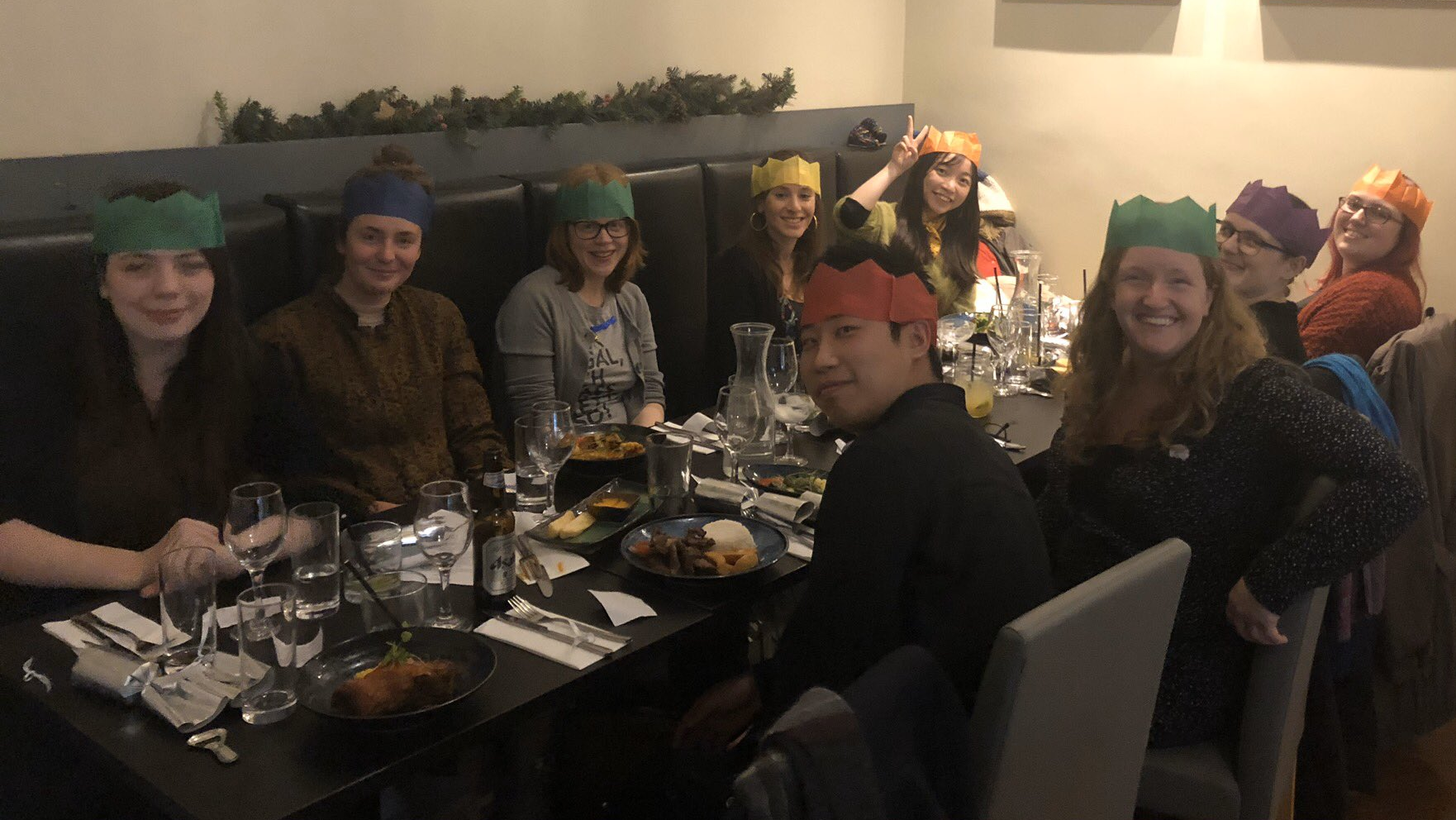
Patricia’s SSI blogpost on computational notebooks is out: https://software.ac.uk/blog/2019-12-18-managing-computational-notebooks-overview-chopportunities.
Patricia also shared the You Got This conference (18 January 2020) which provides a space for early career developers to talk about the non-technical skills needed for a happy, healthy work life, and a preprint Introducing a Framework for Open and Reproducible Research Training (FORRT).
Elizabeth shared a podcast interview she led with John Borghi and Ana Van Gulick for the Canadian Open Neuroscience Platform (CONP) about their move to the libraries from cognitive neuroscience and the importance of open data. Take a listen here: https://conp.ca/conp-elizabeth-dupre-ana-van-gulick-and-john-borghi
She also shared an interesting discussion in the Carpentries community about teaching GitHub given their recently publicized ICE contract. I don’t know what the right move is, here, but I think it’s something to be aware of. Patricia and Yo pointed out that Gitlab isn’t always available in China so it seems to be really hard to find a solution that is open to everyone 😢
Louise built on Elizabeth’s point and shared the summary of the Carpentries' group calls about teaching git/GitHub which make for interesting reading. There are a couple of other calls coming up about the git curriculum this and next week; it’ll be interesting to see what they want to change. In addition to the issue about GitHub’s contract with ICE, there are also some suggestions for alternative stories and the use of GUIs in addition to teaching git via the command line only.
Sarah is SO ready for the Christmas break 😴 (and she isn’t alone!). Georgia agreed. She’s back in her Scottish hometown to see my family, and getting used (again) to random people saying good morning to me!
Ang shared the news that Nature Materials are requiring data availability statements in their following papers.
“93% of the papers published in the first ten months of 2019 in Nature Materials declare that at least some of the data are available only from authors upon request. Needless to say, e-mailing authors for data is neither a sustainable nor a reliable way of getting it”.
Georgia shared this twitter thread by Rachel Thomas about the difference between what machine learning algorithms pay attention to and what human children focus on.
Yini went to France last weekend. It’s possible that the trains, subways and planes could shut down every day because of the strike which has no end date! She reminded everyone to check their travel plans before they set out over Christmas.
She shared this beautiful picture of the Festival of Lights in Lyon.
Finally, you can change your Amazon Smile charity to Autistica to support their great work if you’d like to.
Questions we’re thinking about
At the dinner Konrad asked how labs can be configured to engender a great working environment? For example, some have slow coffee making facillities that encourage informal work chats. Making sure that the workspace is welcoming (not in a basement for example!) so folks want to come in!
Elizabeth shared an idea that hot-desking, or a similar semi-fluid seating arrangement could encourage folks to interact with the lab more broadly. I think this can be done really well (but I also worry it could be done really badly!) to help create connections.
Ang agreed that what the Turing does very well is have so many meeting rooms. Probably the best balance is to have places to work quietly and alone (e.g. do some writing or coding) and places for communication (e.g. brainstorming) that everyone in the lab can freely choose between.
Kirstie shared this amazing tool that links Zoom and Slack to provide a virtual workplace!
Patricia is considering joining the Labour party because she wants to do something to change politics in this country (also, in Scotland they probably don’t really stand much chance at the moment). She asked “Is that a good idea or is focussing on local kindness better?”
Konrad and Georgia agreed that they’re feeling similarly stuck and despondent. It is possible to wait to know who the leadership candidates are before joining up, so it isn’t an urgent decision, just one to keep a careful eye on.
Sarah shared that she always finds these questions the hardest section of Whitaker lab meetings? Its hard to know what to ask that isn’t too broad that she’s not going to do anything with it, or so specific that no one in this group is likely to be able to help her.
Elizabeth, Louise and Yini all shared a strong agree 😅 (Most of the time) it’s a good kind of difficult and very dependent on what’s going on in a given week. Technical aspects are where the lab are the most different to each other but it is easier to find questions about work processes, outreach, teaching, events etc. In general, it’s hard when there is a definitive answer, and easier when there are lots of opinions about a topic and when a discussion about it would be helpful.
Elizabeth is trying to help put some collaborators on a good path for thinking about project management and community building. She asked whether, other than absolutely everything from Mozilla Open Leaders (💖), are there resources we’d recommend?
Louise is starting to think about topics for next year’s reproducible research lunches. We had quite a few PhD students coming along last term so she wants to keep things going 😄 Any ideas, suggestions or volunteers? A couple of ideas we didn’t manage to fit in last term were testing and research data management. Some project demos would be great, but finding volunteers is much harder!
Georgia is doing qualitative analysis and was wondering if anyone has expertise they can share for analysing and extracting themes from group discussions?
Yini shared a paper published in neuroimage: “Agito ergo sum: Correlates of spatio-temporal motion characteristics during fMRI” (doi: 10.1016/j.neuroimage.2019.116433). It showed fMRI head movement is associated with too many factors such as weight, height, sleep, self-regulation, working memory,etc. She wondered if these correlations are sometimes influenced by mediating factors?
Ang asked about tips for a visiting student to spend his time during Christmas in London (when not working at home)?
Louise recommended that he enjoy the peace and quiet while he can 😄
A university friend of mine who stayed in London over Christmas used to enjoy going for walks around the city on Christmas Day/Boxing Day because there were so few people there. Personally, I really like the area of South Kensington during winter - they put lights up around the Natural History museum and it looks lovely at nighttime. They have an ice rink there too if that’s your kind of thing. The others museums there are great too - the Science Museum and the V&A. Going a bit further north, Primrose Hill and Hampstead Heath are both lovely places to go for walks if it’s one of those cold, sunny and crisp days - but make sure to wrap up warm!
Anything else
That is more than enough for this final blog post of the year. As I said above, I’m do delighted to be a member of this awe inspiring group.
Happy holidays everyone. Rest, and enjoy the break 🎄 🎁 🌟
